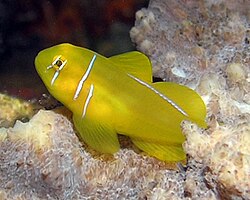Difference between revisions of "Gobiodon citrinus"
From The Aquarium Wiki
| Line 6: | Line 6: | ||
|image=Lemon Goby.jpg | |image=Lemon Goby.jpg | ||
|caption=Clown Goby | |caption=Clown Goby | ||
| − | |availability= | + | |availability=C |
|habitat=indo-pacific | |habitat=indo-pacific | ||
|family=Gobiidae | |family=Gobiidae | ||
| Line 35: | Line 35: | ||
|max_water_hardness=12 | |max_water_hardness=12 | ||
}} | }} | ||
| + | |||
| + | == Origin == | ||
| + | :Indo Pacific: found throut southern Japan, and Australia to the Red Sea. | ||
| + | |||
| + | |||
| + | == Sexing == | ||
| + | :It is very difficult to visually sex Citron Gobies. | ||
| + | |||
== Tank compatibility == | == Tank compatibility == | ||
:A generally peaceful fish, although may be territorial towards others of its own kind. This fish is reef-safe but may nibble at the base and polyps of Acropora corals. | :A generally peaceful fish, although may be territorial towards others of its own kind. This fish is reef-safe but may nibble at the base and polyps of Acropora corals. | ||
| + | |||
| + | == Diet == | ||
| + | :A herbivore that will graze algae and may take crushed marine flakes, seaweed or nori. Can be tricky to feed initially. | ||
| + | |||
| + | |||
| + | == Feeding regime == | ||
| + | :Feed once or twice a day depending on algae content of the tank. | ||
| + | |||
| + | |||
| + | == Environment specifics == | ||
| + | :Reef-safe and should not bother corals. Provide this fish with a mature tank with plenty of hiding places. | ||
| + | |||
| + | |||
| + | == Behaviour == | ||
| + | :A generally peaceful Blenny that will spend its time in and around the live rock and will perch on ledges to survey its surroundings. | ||
| + | |||
| + | |||
| + | == Identification == | ||
| + | :Variable in colour from grey to brown-orange and head grey-blue. Iris is yellow and a yellow line runs from below eye to above axil. Several similar species and this one is best distinguished by the black spot on the caudal fin base. | ||
| + | |||
| + | |||
| + | ==Notes== | ||
| + | :This species has a bitter-tasting mucous coating; this causes predators to spit it out, and avoid it in the future. | ||
{{Categories | {{Categories | ||
| Line 49: | Line 80: | ||
*[http://www.liveaquaria.com/product/prod_display.cfm?c=15+1926+161&pcatid=161 Live Aquaria] | *[http://www.liveaquaria.com/product/prod_display.cfm?c=15+1926+161&pcatid=161 Live Aquaria] | ||
*[https://www.bluezooaquatics.com/productDetail.asp?did=1&pid=574&cid=18 Blue Zoo Aquatics] | *[https://www.bluezooaquatics.com/productDetail.asp?did=1&pid=574&cid=18 Blue Zoo Aquatics] | ||
| + | *[http://www.freshmarine.com/citron-clown-goby.html Freshmarine] | ||
| + | *[https://www.saltwaterfish.com/product-citron-clown-goby-yellowfiji Saltwaterfish.com] | ||
Revision as of 01:57, 3 January 2018
Citron Goby
Gobiodon citrinus
57 Litres (15 US G.)
3.8-5.1cm (1.5-2 ")
8.1 - 8.4
22.2-25.6°C (72 -78 °F)
8-12 °d
1:1 M:F
5-8 years
Family
Gobiidae
This animal is available captive bred
| You can contribute to the Aquarium Wiki by expanding this article. Dont be shy!. |
Contents
Additional names
- Clown Goby, Poison Goby
Origin
- Indo Pacific: found throut southern Japan, and Australia to the Red Sea.
Sexing
- It is very difficult to visually sex Citron Gobies.
Tank compatibility
- A generally peaceful fish, although may be territorial towards others of its own kind. This fish is reef-safe but may nibble at the base and polyps of Acropora corals.
Diet
- A herbivore that will graze algae and may take crushed marine flakes, seaweed or nori. Can be tricky to feed initially.
Feeding regime
- Feed once or twice a day depending on algae content of the tank.
Environment specifics
- Reef-safe and should not bother corals. Provide this fish with a mature tank with plenty of hiding places.
Behaviour
- A generally peaceful Blenny that will spend its time in and around the live rock and will perch on ledges to survey its surroundings.
Identification
- Variable in colour from grey to brown-orange and head grey-blue. Iris is yellow and a yellow line runs from below eye to above axil. Several similar species and this one is best distinguished by the black spot on the caudal fin base.
Notes
- This species has a bitter-tasting mucous coating; this causes predators to spit it out, and avoid it in the future.
Pictures
External links
- Fishbase (Mirrors:
 )
)
